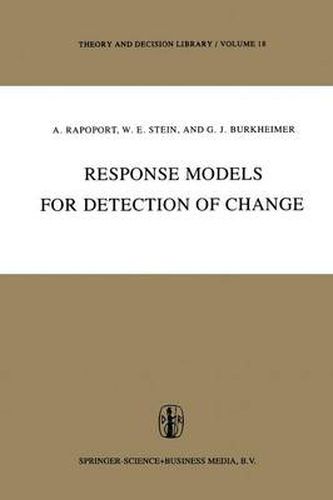Readings Newsletter
Become a Readings Member to make your shopping experience even easier.
Sign in or sign up for free!
You’re not far away from qualifying for FREE standard shipping within Australia
You’ve qualified for FREE standard shipping within Australia
The cart is loading…






This title is printed to order. This book may have been self-published. If so, we cannot guarantee the quality of the content. In the main most books will have gone through the editing process however some may not. We therefore suggest that you be aware of this before ordering this book. If in doubt check either the author or publisher’s details as we are unable to accept any returns unless they are faulty. Please contact us if you have any questions.
This book reports our research on detection of change processes that underlie psychophysical, learning, medical diagnosis, military, and pro duction control situations, and share three major features. First, the states of the process are not directly observable but become gradually known with the sequential acquisition of fallible information over time. Second, the mechanism that generates the fallible information is not stationary; rather, it is subjected to a sudden and irrevocable change. Thirdly, in complete, probabilistic information about the time of change is available when the process commences. The purpose of the book is to characterize this class of detection of change processes, to derive the optimal policy that minimizes total expected loss, and, most importantly, to develop testable response models, based on simple decision rules, for describing detection of change behavior. The book is theoretical in the sense that it offers mathematical models of multi-stage decision behavior and solutions to optimization problems. However, it is not anti-empirical, as it aims to stimulate new experimental research and to generate applications. Throughout the book, questions of experimental verification are briefly considered, and existing data from two studies are brought to bear on the validity of the models. The work is not complete; it only provides a starting point for investigating how people detect a change in an uncertain environment, balancing between the cost of delay in detecting the change and the cost of making an incor rect terminal decision.
$9.00 standard shipping within Australia
FREE standard shipping within Australia for orders over $100.00
Express & International shipping calculated at checkout
This title is printed to order. This book may have been self-published. If so, we cannot guarantee the quality of the content. In the main most books will have gone through the editing process however some may not. We therefore suggest that you be aware of this before ordering this book. If in doubt check either the author or publisher’s details as we are unable to accept any returns unless they are faulty. Please contact us if you have any questions.
This book reports our research on detection of change processes that underlie psychophysical, learning, medical diagnosis, military, and pro duction control situations, and share three major features. First, the states of the process are not directly observable but become gradually known with the sequential acquisition of fallible information over time. Second, the mechanism that generates the fallible information is not stationary; rather, it is subjected to a sudden and irrevocable change. Thirdly, in complete, probabilistic information about the time of change is available when the process commences. The purpose of the book is to characterize this class of detection of change processes, to derive the optimal policy that minimizes total expected loss, and, most importantly, to develop testable response models, based on simple decision rules, for describing detection of change behavior. The book is theoretical in the sense that it offers mathematical models of multi-stage decision behavior and solutions to optimization problems. However, it is not anti-empirical, as it aims to stimulate new experimental research and to generate applications. Throughout the book, questions of experimental verification are briefly considered, and existing data from two studies are brought to bear on the validity of the models. The work is not complete; it only provides a starting point for investigating how people detect a change in an uncertain environment, balancing between the cost of delay in detecting the change and the cost of making an incor rect terminal decision.